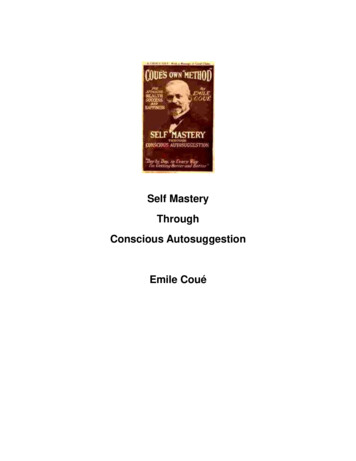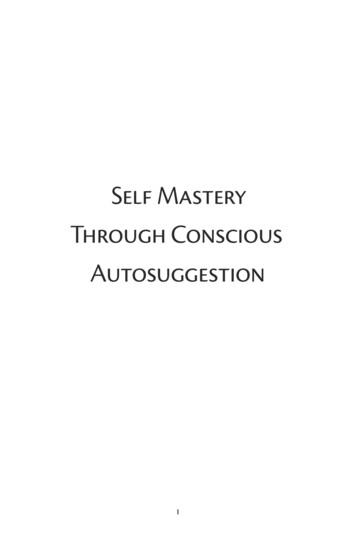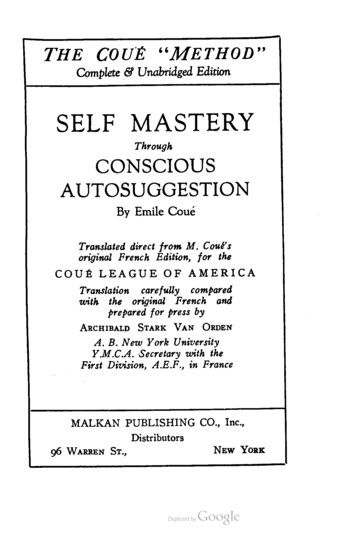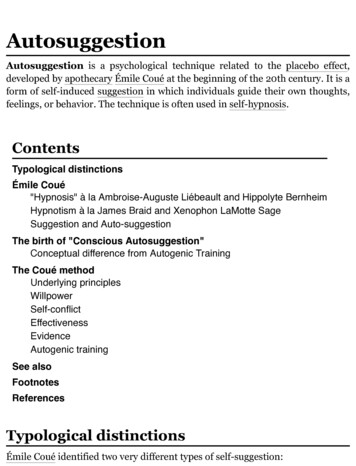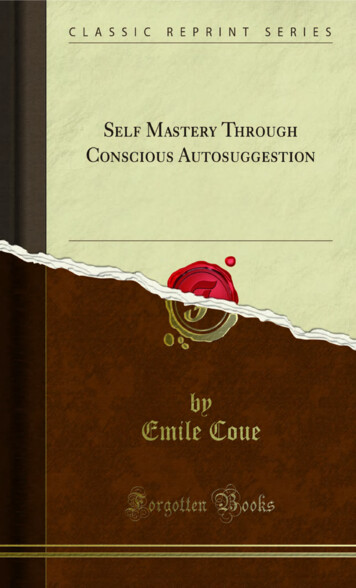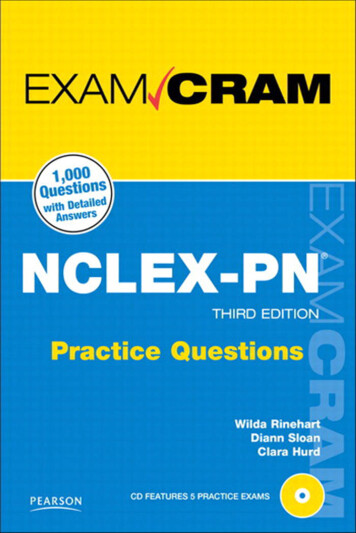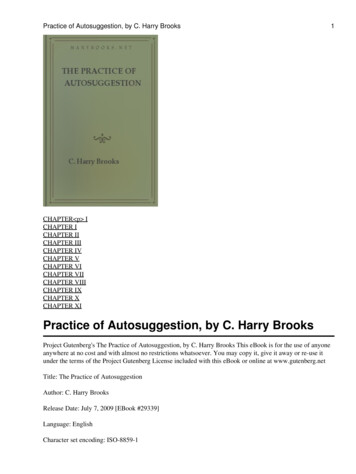
Transcription
Practice of Autosuggestion, by C. Harry BrooksCHAPTER p ICHAPTER ICHAPTER IICHAPTER IIICHAPTER IVCHAPTER VCHAPTER VICHAPTER VIICHAPTER VIIICHAPTER IXCHAPTER XCHAPTER XIPractice of Autosuggestion, by C. Harry BrooksProject Gutenberg's The Practice of Autosuggestion, by C. Harry Brooks This eBook is for the use of anyoneanywhere at no cost and with almost no restrictions whatsoever. You may copy it, give it away or re-use itunder the terms of the Project Gutenberg License included with this eBook or online at www.gutenberg.netTitle: The Practice of AutosuggestionAuthor: C. Harry BrooksRelease Date: July 7, 2009 [EBook #29339]Language: EnglishCharacter set encoding: ISO-8859-11
Practice of Autosuggestion, by C. Harry Brooks2*** START OF THIS PROJECT GUTENBERG EBOOK THE PRACTICE OF AUTOSUGGESTION ***Produced by Al HainesTHE PRACTICE OF AUTOSUGGESTIONBY THE METHOD of EMILE COUÉRevised EditionBYC. HARRY BROOKSWITH A FOREWORD BYEMILE COUÉ"For what man knoweth the things of a man save the spirit of the man which is in him?"1 CORINTHIANS ii. 11.NEW YORKDODD, MEAD AND COMPANY1922COPYRIGHT 1922BY DODD, MEAD AND COMPANY, INC.First Printing, May, 1922 Second Printing, June, 1922 Third Printing, June, 1922 Fourth Printing, July, 1922Fifth Printing, July, 1922 Sixth Printing, Aug., 1922 Seventh Printing, Aug., 1922 Eighth Printing, Aug., 1922Ninth Printing, Sept., 1922 Tenth Printing, Sept., 1922 Eleventh Printing, Nov., 1922 Twelfth Printing, Nov.,1922 Thirteenth Printing, Dec., 1922 Fourteenth Printing, Jan., 1923PRINTED IN THE U. S. A. BY The Quinn & Boden Company BOOK MANUFACTURERS RAHWAYNEW JERSEYTOALL IN CONFLICT WITHTHEIR OWN IMPERFECTIONSTHIS LITTLE BOOKIS DEDICATEDPREFACE TO THE AMERICAN EDITION
Practice of Autosuggestion, by C. Harry Brooks3To my American readers a special word of gratitude is due for their generosity to this little book. I hope that ithas given them as much encouragement and help as they have given me.In America, the home of so many systems of mental healing, it is perhaps even more necessary than in Europeto insist on the distinctive features of M. Coué's teaching. It is based, not on transcendental or mysticalpostulates, but on the simple and acknowledged facts of psychology. This does not mean that it has no relationto religion. On the contrary it has a very close one. Indeed I hope in a future volume to point out its deepsignificance for the Christian churches. But that relationship remains in M. Coué's teaching unexpressed. Thepowers he has revealed are part of the natural endowment of the human mind. Therefore they are available toall men, independently of adherence or non-adherence to any sect or creed.The method of M. Coué is in no sense opposed to the ordinary practice of medicine. It is not intended tosupplant it but to supplement it. It is a new ally, bringing valuable reinforcements to the common crusadeagainst disease and unhappiness.Induced Autosuggestion does not involve, as several hasty critics have assumed, an attack upon the Will. Itsimply teaches that during the actual formulation of suggestions, that is for a few minutes daily, the Willshould be quiescent. At other times the exercise of the Will is encouraged; indeed we are shown how to use itproperly, that is without friction or waste of energy.C. H. B.19 October, 1922.AUTHOR'S PREFACEThe discoveries of Emile Coué are of such moment for the happiness and efficiency of the individual life thatit is the duty of anyone acquainted with them to pass them on to his fellows.The lives of many men and women are robbed of their true value by twists and flaws of character andtemperament, which, while defying the efforts of the will, would yield rapidly to the influence ofautosuggestion. Unfortunately, the knowledge of this method has hitherto been available in England only inthe somewhat detailed and technical work of Professor Charles Baudouin, and in a small pamphlet, printedprivately by M. Coué, which has not been publicly exposed for sale. To fill this gap is the aim of thefollowing pages. They are designed to present to the layman in non-technical form the information necessaryto enable him to practise autosuggestion for himself.All readers who wish to obtain a deeper insight into the theoretical basis of autosuggestion are recommendedto study Professor Baudouin's fascinating work, Suggestion and Autosuggestion. Although in these pagesthere are occasional divergences from Professor Baudouin's views, his book remains beyond question theauthoritative statement on the subject; indeed it is hardly possible without it to form an adequate idea of thescope of autosuggestion. My own indebtedness to it in writing this little volume is very great.My thanks are due for innumerable kindnesses to M. Coué himself. That he is the embodiment of patienceeveryone knows who has been in contact with him. I am also indebted to the Rev. Ernest Charles, of MalvernLink, who, though disclaiming responsibility for some of the views expressed here, has made many extremelyvaluable suggestions.C. H. B.MALVERN LINK, 21 February, 1922.
Practice of Autosuggestion, by C. Harry Brooks4FOREWORDThe materials for this little book were collected by Mr. Brooks during a visit he paid me in the summer of1921. He was, I think, the first Englishman to come to Nancy with the express purpose of studying mymethod of conscious autosuggestion. In the course of daily visits extending over some weeks, by attending myconsultations, and by private conversations with myself, he obtained a full mastery of the method, and wethreshed out a good deal of the theory on which it rests.The results of this study are contained in the following pages. Mr. Brooks has skilfully seized on the essentialsand put them forward in a manner that seems to me both simple and clear. The instructions given are amplysufficient to enable anyone to practise autosuggestion for him or herself, without seeking the help of any otherperson.It is a method which everyone should follow--the sick to obtain healing, the healthy to prevent the coming ofdisease in the future. By its practice we can insure for ourselves, all our lives long, an excellent state of health,both of the mind and the body.E. COUÉ.NANCY.CONTENTSPREFACEFOREWORDICOUÉ'S NANCY PRACTICE
CHAPTERCHAPTERITHE CLINIC OF EMILE COUÉ II A FEW OF COUÉ'S CURES III THE CHILDREN'S CLINICIITHE NATURE OF AUTOSUGGESTIONIV THOUGHT IS A FORCE V THOUGHT AND THE WILLIIITHE PRACTICE OF AUTOSUGGESTIONVI GENERAL RULES VII THE GENERAL FORMULA VIII PARTICULAR SUGGESTIONS IX HOWTO DEAL WITH PAIN X AUTOSUGGESTION AND THE CHILD XI CONCLUSIONICOUÉ'S NANCY PRACTICE5
CHAPTER I6CHAPTER ITHE CLINIC OF EMILE COUÉThe clinic of Emile Coué, where Induced Autosuggestion is applied to the treatment of disease, is situated in apleasant garden attached to his house at the quiet end of the rue Jeanne d'Arc in Nancy. It was here that Ivisited him in the early summer of 1921, and had the pleasure for the first time of witnessing one of hisconsultations.We entered the garden from his house a little before nine o'clock. In one corner was a brick building of twostories, with its windows thrown wide to let in the air and sunshine--this was the clinic; a few yards away wasa smaller one-storied construction which served as a waiting-room. Under the plum and cherry trees, nowladen with fruit, little groups of patients were sitting on the garden seats, chatting amicably together andenjoying the morning sunshine while others wandered in twos and threes among the flowers and strawberrybeds. The room reserved for the treatments was already crowded, but in spite of that eager newcomersconstantly tried to gain entrance. The window-sills on the ground floor were beset, and a dense knot hadformed in the doorway. Inside, the patients had first occupied the seats which surrounded the walls, and thencovered the available floor-space, sitting on camp-stools and folding-chairs. Coué with some difficulty foundme a seat, and the treatment immediately began.The first patient he addressed was a frail, middle-aged man who, accompanied by his daughter, had justarrived from Paris to consult him. The man was a bad case of nervous trouble. He walked with difficulty, andhis head, arms and legs were afflicted with a continual tremor. He explained that if he encountered a strangerwhen walking in the street the idea that the latter would remark his infirmity completely paralysed him, and hehad to cling to whatever support was at hand to save himself from falling. At Coué's invitation he rose fromhis seat and took a few steps across the floor. He walked slowly, leaning on a stick; his knees were half bent,and his feet dragged heavily along the ground.Coué encouraged him with the promise of improvement. "You have been sowing bad seed in yourUnconscious; now you will sow good seed. The power by which you have produced these ill effects will infuture produce equally good ones."The next patient was an excitable, over-worked woman of the artisan class. When Coué inquired the nature ofher trouble, she broke into a flood of complaint, describing each symptom with a voluble minuteness."Madame," he interrupted, "you think too much about your ailments, and in thinking of them you create freshones."Next came a girl with headaches, a youth with inflamed eyes, and a farm-labourer incapacitated by varicoseveins. In each case Coué stated that autosuggestion should bring complete relief. Then it was the turn of abusiness man who complained of nervousness, lack of self-confidence and haunting fears."When you know the method," said Coué, "you will not allow yourself to harbour such ideas.""I work terribly hard to get rid of them," the patient answered."You fatigue yourself. The greater the efforts you make, the more the ideas return. You will change all thateasily, simply, and above all, without effort.""I want to," the man interjected."That's just where you're wrong," Coué told him. "If you say 'I want to do something,' your imaginationreplies 'Oh, but you can't.' You must say 'I am going to do it,' and if it is in the region of the possible you will
CHAPTER I7succeed."A little further on was another neurasthenic--a girl. This was her third visit to the clinic, and for ten days shehad been practising the method at home. With a happy smile, and a little pardonable self-importance, shedeclared that she already felt a considerable improvement. She had more energy, was beginning to enjoy life,ate heartily and slept more soundly. Her sincerity and naïve delight helped to strengthen the faith of herfellow-patients. They looked on her as a living proof of the healing which should come to themselves.Coué continued his questions. Those who were unable, whether through rheumatism or some paralyticaffection, to make use of a limb were called on, as a criterion of future progress, to put out their maximumefforts.In addition to the visitor from Paris there were present a man and a woman who could not walk withoutsupport, and a burly peasant, formerly a blacksmith, who for nearly ten years had not succeeded in lifting hisright arm above the level of his shoulder. In each case Coué predicted a complete cure.During this preliminary stage of the treatment, the words he spoke were not in the nature of suggestions. Theywere sober expressions of opinion, based on years of experience. Not once did he reject the possibility of cure,though with several patients suffering from organic disease in an advanced stage, he admitted its unlikelihood.To these he promised, however, a cessation of pain, an improvement of morale, and at least a retardment ofthe progress of the disease. "Meanwhile," he added, "the limits of the power of autosuggestion are not yetknown; final recovery is possible." In all cases of functional and nervous disorders, as well as the less seriousones of an organic nature, he stated that autosuggestion, conscientiously applied, was capable of removing thetrouble completely.It took Coué nearly forty minutes to complete his interrogation. Other patients bore witness to the benefits thetreatment had already conferred on them. A woman with a painful swelling in her breast, which a doctor haddiagnosed (in Coué's opinion wrongly), as of a cancerous nature, had found complete relief after less thanthree weeks' treatment. Another woman had enriched her impoverished blood, and increased her weight byover nine pounds. A man had been cured of a varicose ulcer, another in a single sitting had rid himself of alifelong habit of stammering. Only one of the former patients failed to report an improvement. "Monsieur,"said Coué, "you have been making efforts. You must put your trust in the imagination, not in the will. Thinkyou are better and you will become so."Coué now proceeded to outline the theory given in the pages which follow. It is sufficient here to state hismain conclusions, which were these: (1) Every idea which exclusively occupies the mind is transformed intoan actual physical or mental state. (2) The efforts we make to conquer an idea by exerting the will only serveto make that idea more powerful. To demonstrate these truths he requested one of his patients, a younganaemic-looking woman, to carry out a small experiment. She extended her arms in front of her, and claspedthe hands firmly together with the fingers interlaced, increasing the force of her grip until a slight tremor setin. "Look at your hands," said Coué, "and think you would like to open them but you cannot. Now try and pullthem apart. Pull hard. You find that the more you try the more tightly they become clasped together."The girl made little convulsive movements of her wrists, really doing her best by physical force to separateher hands, but the harder she tried the more her grip increased in strength, until the knuckles turned white withthe pressure. Her hands seemed locked together by a force outside her own control."Now think," said Cone, "'I can open my hands.'"Slowly her grasp relaxed and, in response to a little pull, the cramped fingers came apart. She smiled shyly atthe attention she had attracted, and sat down.
CHAPTER I8Coué pointed out that the two main points of his theory were thus demonstrated simultaneously: when thepatient's mind was filled with the thought "I cannot," she could not in very fact unclasp her hands. Further, theefforts she made to wrench them apart by exerting her will only fixed them more firmly together.Each patient was now called on in turn to perform the same experiment. The more imaginative amongthem--notably the women--were at once successful. One old lady was so absorbed in the thought "I cannot" asnot to heed the request to think "I can." With her face ruefully puckered up she sat staring fixedly at herinterlocked fingers, as though contemplating an act of fate. "Voilà," said Coué, smiling, "if Madame persistsin her present idea, she will never open her hands again as long as she lives."Several of the men, however, were not at once successful. The whilom blacksmith with the disabled arm,when told to think "I should like to open my hands but I cannot," proceeded without difficulty to open them."You see," said Coué, with a smile, "it depends not on what I say but on what you think. What were youthinking then?"He hesitated. "I thought perhaps I could open them after all.""Exactly. And therefore you could. Now clasp your hands again. Press them together."When the right degree of pressure had been reached, Coué told him to repeat the words "I cannot, I cannot."As he repeated this phrase the contracture increased, and all his efforts failed to release his grip."Voilà," said Coué. "Now listen. For ten years you have been thinking you could not lift your arm above yourshoulder, consequently you have not been able to do so, for whatever we think becomes true for us. Now think'I can lift it.'"The patient looked at him doubtfully."Quick!" Coué said in a tone of authority. "Think 'I can, I can!'""I can," said the man. He made a half-hearted attempt and complained of a pain in his shoulder."Bon," said Coué. "Don't lower your arm. Close your eyes and repeat with me as fast as you can, 'Ca passe, çapasse.'"For half a minute they repeated this phrase together, speaking so fast as to produce a sound like the whirr of arapidly revolving machine. Meanwhile Coué quickly stroked the man's shoulder. At the end of that time thepatient admitted that his pain had left him."Now think well that you can lift your arm," Coué said.The departure of the pain had given the patient faith. His face, which before had been perplexed andincredulous, brightened as the thought of power took possession of him. "I can," he said in a tone of finality,and without effort he calmly lifted his arm to its full height above his head. He held it there triumphantly for amoment while the whole company applauded and encouraged him.Coué reached for his hand and shook it."My friend, you are cured."
CHAPTER I9"C'est merveilleux," the man answered. "I believe I am.""Prove it," said Coué. "Hit me on the shoulder."The patient laughed, and dealt him a gentle rap."Harder," Coué encouraged him. "Hit me harder--as hard as you can."His arm began to rise and fall in regular blows, increasing in force until Coué was compelled to call on him tostop."Voilà, mon ami, you can go back to your anvil."The man resumed his seat, still hardly able to comprehend what had occurred. Now and then he lifted his armas if to reassure himself, whispering to himself in an awed voice, "I can, I can."A little further on was seated a woman who had complained of violent neuralgia. Under the influence of therepeated phrase "ça passe" (it's going) the pain was dispelled in less than thirty seconds. Then it was the turnof the visitor from Paris. What he had seen had inspired him with confidence; he was sitting more erect, therewas a little patch of colour in his cheeks, and his trembling seemed less violent.He performed the experiment with immediate success."Now," said Coué, "you are cultivated ground. I can throw out the seed in handfuls."He caused the sufferer first to stand erect with his back and knees straightened. Then he asked him, constantlythinking "I can," to place his entire weight on each foot in turn, slowly performing the exercise known as"marking time." A space was then cleared of chairs, and having discarded his stick, the man was made to walkto and fro. When his gait became slovenly Coué stopped him, pointed out his fault, and, renewing the thought"I can," caused him to correct it. Progressive improvement kindled the man's imagination. He took himself inhis own hands. His bearing became more and more confident, he walked more easily, more quickly. His littledaughter, all smiles and happy self-forgetfulness, stood beside him uttering expressions of delight, admirationand encouragement. The whole company laughed and clapped their hands."After the sitting," said Coué, "you shall come for a run in my garden."Thus Coué continued his round of the clinic. Each patient suffering from pain was given complete or partialrelief; those with useless limbs had a varying measure of use restored to them. Coué's manner was alwaysquietly inspiring. There was no formality, no attitude of the superior person; he treated everyone, whether richor poor, with the same friendly solicitude. But within these limits he varied his tone to suit the temperament ofthe patient. Sometimes he was firm, sometimes gently bantering. He seized every opportunity for a littlehumorous by-play. One might almost say that he tactfully teased some of his patients, giving them an idea thattheir ailment was absurd, and a little unworthy; that to be ill was a quaint but reprehensible weakness, whichthey should quickly get rid of. Indeed, this denial of the dignity of disease is one of the characteristics of theplace. No homage is paid to it as a Dread Monarch. It is gently ridiculed, its terrors are made to appearsecond-rate, and its victims end by laughing at it.Coué now passed on to the formulation of specific suggestions. The patients closed their eyes, and heproceeded in a low, monotonous voice, to evoke before their minds the states of health, mental and physical,they were seeking. As they listened to him their alertness ebbed away, they were lulled into a drowsy state,peopled only by the vivid images he called up before the eyes of the mind. The faint rustle of the trees, thesongs of the birds, the low voices of those waiting in the garden, merged into a pleasant background, on which
CHAPTER I10his words stood out powerfully.This is what he said:"Say to yourself that all the words I am about to utter will be fixed, imprinted and engraven in your minds;that they will remain fixed, imprinted and engraven there, so that without your will and knowledge, withoutyour being in any way aware of what is taking place, you yourself and your whole organism will obey them. Itell you first that every day, three times a day, morning, noon and evening, at mealtimes, you will be hungry;that is to say you will feel that pleasant sensation which makes us think and say: 'How I should like somethingto eat!' You will then eat with excellent appetite, enjoying your food, but you will never eat too much. Youwill eat the right amount, neither too much nor too little, and you will know intuitively when you have hadsufficient. You will masticate your food thoroughly, transforming it into a smooth paste before swallowing it.In these conditions you will digest it well, and so feel no discomfort of any kind either in the stomach or theintestines. Assimilation will be perfectly performed, and your organism will make the best possible use of thefood to create blood, muscle, strength, energy, in a word--Life."Since you have digested your food properly, the excretory functions will be normally performed. This willtake place every morning immediately on rising, and without your having recourse to any laxative medicine orartificial means of any kind."Every night you will fall asleep at the hour you wish, and will continue to sleep until the hour at which youdesire to wake next morning. Your sleep will be calm, peaceful and profound, untroubled by bad dreams orundesirable states of body. You may dream, but your dreams will be pleasant ones. On waking you will feelwell, bright, alert, eager for the day's tasks."If in the past you have been subject to depression, gloom and melancholy forebodings, you willhenceforward be free from such troubles. Instead of being moody, anxious and depressed, you will be cheerfuland happy. You will be happy even if you have no particular reason for being so, just as in the past you were,without good reason, unhappy. I tell you even that if you have serious cause to be worried or depressed, youwill not be so."If you have been impatient or ill-tempered, you will no longer be anything of the kind; on the contrary, youwill always be patient and self-controlled. The happenings which used to irritate you will leave you entirelycalm and unmoved."If you have sometimes been haunted by evil and unwholesome ideas, by fears or phobias, these ideas willgradually cease to occupy your mind. They will melt away like a cloud. As a dream vanishes when we wake,so will these vain images disappear."I add that all your organs do their work perfectly. Your heart beats normally and the circulation of the bloodtakes place as it should. The lungs do their work well. The stomach, the intestines, the liver, the biliary duct,the kidneys and the bladder, all carry out their functions correctly. If at present any of the organs named is outof order, the disturbance will grow less day by day, so that within a short space of time it will have entirelydisappeared, and the organ will have resumed its normal function."Further, if in any organ there is a structural lesion, it will from this day be gradually repaired, and in a shortperiod will be completely restored. This will be so even if you are unaware that the trouble exists."I must also add--and it is extremely important--that if in the past you have lacked confidence in yourself, thisself-distrust will gradually disappear. You will have confidence in yourself; I repeat, you will have confidence.Your confidence will be based on the knowledge of the immense power which is within you, by which youcan accomplish any task of which your reason approves. With this confidence you will be able to do anything
CHAPTER I11you wish to do, provided it is reasonable, and anything it is your duty to do."When you have any task to perform you will always think that it is easy. Such words as 'difficult,''impossible,' 'I cannot' will disappear from your vocabulary. Their place will be taken by this phrase: 'It is easyand I can.' So, considering your work easy, even if it is difficult to others, it will become easy to you. You willdo it easily, without effort and without fatigue."These general suggestions were succeeded by particular suggestions referring to the special ailments fromwhich Coué's patients were suffering. Taking each case in turn, he allowed his hand to rest lightly on theheads of the sufferers, while picturing to their minds the health and vigour with which they would soon beendowed. Thus to a woman with an ulcerated leg he spoke as follows: "Henceforth your organism will do allthat is necessary to restore your leg to perfect health. It will rapidly heal; the tissues will regain their tone; theskin will be soft and healthy. In a short space of time your leg will be vigorous and strong and will in futurealways remain so." Each special complaint was thus treated with a few appropriate phrases. When he hadfinished, and the patients were called on to open their eyes, a faint sigh went round the room, as if they wereawaking reluctantly from a delicious dream.Coué now explained to his patients that he possessed no healing powers, and had never healed a person in hislife. They carried in themselves the instrument of their own well-being. The results they had seen were due tothe realisation of each patient's own thought. He had been merely an agent calling the ideas of health into theirminds. Henceforth they could, and must, be the pilots of their own destiny. He then requested them to repeat,under conditions which will be later defined, the phrase with which his name is associated: "Day by day, inevery way, I'm getting better and better."[1]The sitting was at an end. The patients rose and crowded round Coué, asking questions, thanking him, shakinghim by the hand. Some declared they were already cured, some that they were much better, others that theywere confident of cure in the future. It was as if a burden of depression had fallen from their minds. Thosewho had entered with minds crushed and oppressed went out with hope and optimism shining in their faces.But Coué waved aside these too insistent admirers, and, beckoning to the three patients who could not walk,led them to a corner of the garden where there was a stretch of gravel path running beneath the boughs of fruittrees. Once more impressing on their minds the thought of strength and power, he induced each one to walkwithout support down this path. He now invited them to run. They hesitated, but he insisted, telling them thatthey could run, that they ought to run, that they had but to believe in their own power, and their thought wouldbe manifested in action.They started rather uncertainly, but Coué followed them with persistent encouragements. They began to raisetheir heads, to lift their feet from the ground and run with greater freedom and confidence. Turning at the endof the path they came back at a fair pace. Their movements were not elegant, but people on the further side offifty are rarely elegant runners. It was a surprising sight to see these three sufferers who had hobbled to theclinic on sticks now covering the ground at a full five miles an hour, and laughing heartily at themselves asthey ran. The crowd of patients who had collected broke into a spontaneous cheer, and Coué, slippingmodestly away, returned to the fresh company of sufferers who awaited him within.[1] The translation given here of Coué's formula differs slightly from that popularised in England during hisvisit of November, 1921. The above, however, is the English version which he considers most suitable.
CHAPTER II12CHAPTER IIA FEW OF COUÉ'S CURESTo give the reader a better idea of the results which Induced Autosuggestion is yielding, I shall here describe afew further cases of which I was myself in some part a witness, and thereafter let some of Coué's patientsspeak for themselves through the medium of their letters.At one of the morning consultations which I subsequently attended was a woman who had suffered for fiveyears with dyspepsia. The trouble had recently become so acute that even the milk diet to which she was nowreduced caused her extreme discomfort. Consequently she had become extremely thin and anaemic, waslistless, easily tired, and suffered from depression. Early in the proceedings the accounts given by severalpatients of the relief they had obtained seemed to appeal to her imagination. She followed Coué's remarkswith keen interest, answered his questions vivaciously, and laughed very heartily at the amusing incidentswith which the proceedings were interspersed. About five o'clock on the same afternoon I happened to besitting with Coué when this woman asked to see him. Beaming with satisfaction, she was shown into theroom. She reported that on leaving the clinic she had gone to a restaurant in the town and ordered a tabled'hôte luncheon. Conscientiously she had partaken of every course from the hors d'oeuvres to the café noir.The meal had been concluded at 1.30, and she had so far experienced no trace of discomfort. A few days laterthis woman returned to the clinic to report that the dyspepsia had shown no signs of reappearing; that herhealth and spirits were improving, an
the clinic of emile couÉ ii a few of couÉ's cures iii the children's clinic ii the nature of autosuggestion iv thought is a force v thought and the will iii the practice of autosuggestion vi general rules vii the general formula viii particular suggestions ix how to deal with pain x autosuggestion and the child xi conclusion i couÉ's nancy .

